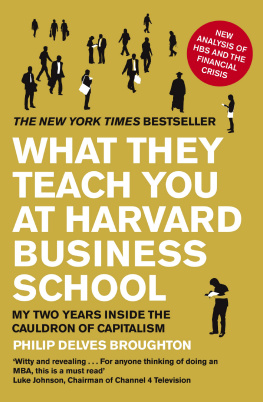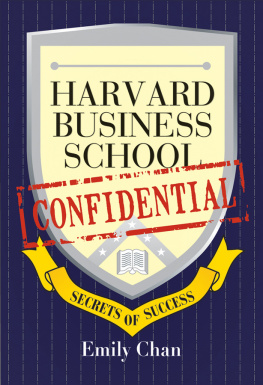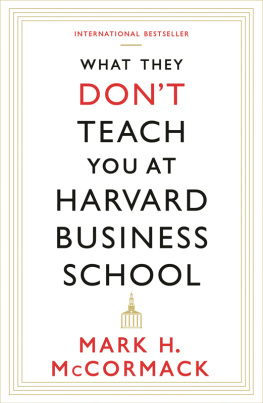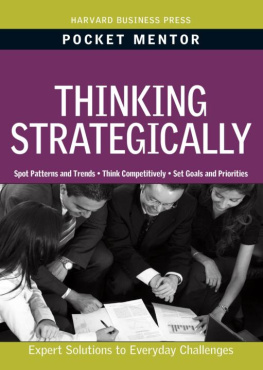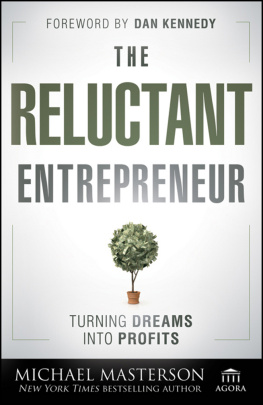CONTENTS
ABOUT THE BOOK
Written with the cooperation of Harvard Business School, this is an instructive and inspiring book for anyone who dreams of starting a successful business.
The Intelligent Entrepreneur tells how three HBS graduates turned down six-figure salaries at big corporations, bet on themselves and launched their own new companies. By their ten-year reunion their audacity had paid huge dividends. Theyd made many millions of dollars, created hundreds of jobs and left their mark on the world.
Based on dozens of interviews with highly successful entrepreneurs, Harvard Business School professors and HBS alumni, The Intelligent Entrepreneur tells the compelling and instructive story of how these three young founders developed ideas, assembled teams, built ventures, and achieved their dreams.
Along the way, they learned that starting great companies requires much more than a ferocious work ethic or good timing. Their hard-won insightsdistilled into ten key ruleswill help anyone become a successful entrepreneur.
ABOUT THE AUTHOR
Bill Murphy is the author of In a Time of War: The Proud and Perilous Journey of West Points Class of 2002. Previously, he worked as Bob Woodwards research assistant on the bestselling State of Denial. An inveterate entrepreneur who was on the founding teams of three separate start-ups, he is also a former military officer, lawyer, and Washington Post reporter.
How Three Harvard Business School Graduates Learned
the 10 Rules of Successful Business
Bill Murphy
To Melissaa true entrepreneur
INTRODUCTION
WONDERFUL NEWS:
MOST NEW BUSINESSES FAIL
Let me guess. If youre reading this book, its probably because you hope to become a truly successful entrepreneur. You want to build something dynamic, useful, and great, and maybe even get rich in the process. If thats the case, then allow me to give you the good news right up front:
Most new ventures failusually for good reasons.
They fail because their founders launch without being truly committed to their success. They fail because a would-be entrepreneur becomes convinced that a lousy business idea is brilliant, or because he doesnt understand the market hes targeting. They fail because their leaders dont hire the right people or offer the best people a good reason to join the venture. They fail because the founders dont have enough capital, dont know how to communicate effectively, or dont adapt to take advantage of new opportunities. Sometimes they fail because of bad luck. But more oftenand this is keyunsuccessful entrepreneurs blame bad luck because they dont understand what actually caused their failure.
How can all this amount to good news for aspiring entrepreneurs? Simple: it opens up a world of opportunity. Since most founders dont learn from their successes and failures (let alone those of their predecessors), anyone who is willing and eager to learn the rules of successful entrepreneurship can enjoy a great advantage.
We live in a culture that claims to value entrepreneurship. Weve made household names of the founders of some of our most successful companies. If youre standing in the business section at Barnes & Noble as you read this, or browsing through this book on Amazon, chances are youll see the memoirs of several of those founders nearby.
But in recent years much of the success that many entrepreneurs supposedly achieved was revealed as illusory. Market after market collapsed. Companies that were once worth a great deal of money on paper shut their doors. More recently, a new body of research has shown that much of what we think we know about entrepreneurship is wrong. We think of startups as exciting new ventures, incorporating spectacular innovation and great new ideas. We imagine businesses operating in emerging fields, led by founders with big dreams for growth. But the truth is quite different.
- Most new businesses launch in unattractive, static fields.
- Most startups offer no innovation or competitive advantage, cannot articulate growth plans, employ only the founders, and generate revenues of less than $100,000 a year.
- Only a third of new businesses last seven years.
- The typical startup begins with less than $25,000 in capital, acquired from the founders savings (or run up on his or her personal credit cards).
Sounds daunting, doesnt it? But for the committed founder, the one who is truly determined to dare mighty things and succeed, all that entrepreneurial carnage can be a blessing. Heres why.
First, there is rarely any reason to reinvent the wheel in entrepreneurship. Some successful founder, somewhere, has addressed the same issues that just about every founder or aspiring entrepreneur faces today. By studying their examples and outcomes, the intelligent entrepreneur can dramatically improve his or her odds of success. The answers are out there, if only you know where to look.
Second, the doomed-to-fail entrepreneur doesnt have to be you. He or she can beshould beyour competition. Remember General George Pattons wise advice about the nobility of sacrificing ones life in combat: No bastard ever won a war by dying for his country. He won it by making the other poor dumb bastard die for his country.
MODELING SUCCESS
Easy enough, right? Just identify the best examples and follow them. As it turns out, though, these lessons can be difficult to find. Even at a place like Harvard Business School (HBS), where they investigate successful enterprises for a living, there is a wealth of academic research on how to manage and grow big corporationsbut nowhere near as much data-driven research on early-stage companies.
Even knowing what questions to ask is difficult, explains Noam Wasserman, an HBS professor who specializes in entrepreneurship. Moreover, these are private companies. And that means that inherently there are no data. I have to go out and collect all of my own data.
True, Wasserman continues, when companies prepare for an initial public offering, they have to reveal themselves to the Securities and Exchange Commission (SEC) and the world. But when academics study these companies, Wasserman points out, they are almost never able to study founders, because at that point few of them are still around. Until recently, we werent able to really draw any real conclusions about the types of issues and decisions that founders face.
I know that other authors have tried to tackle this problem. But this book is different from others, most of which choose between providing a dry analysis of founders and startups, or using made-up examples, anonymous anecdotes, and composite stories to illustrate their theories. Instead, The Intelligent Entrepreneur tells the true stories of three entrepreneurs from the Harvard Business School class of 1998 who started four successful businesses within ten years of graduating. Over the course of that decade, these HBS graduates also learned ten key rules of intelligent entrepreneurship, and this book examines the rules in detail, allowing every reader to discover what it takes to start a new business and make it a big success.


